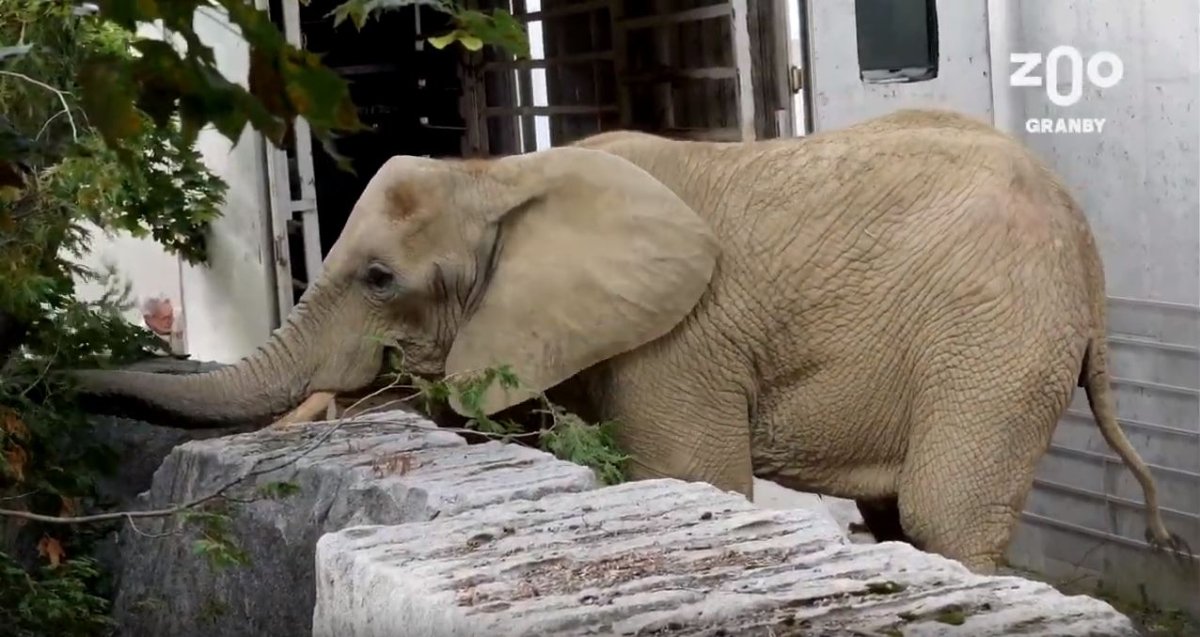A zoo in Quebec plans to get out of the elephant business, its CEO said as a senator introduced a federal bill Tuesday that would phase out keeping the animals in captivity.

Paul Gosselin said the Granby Zoo has been thinking about getting out of the elephant business for the last few years.
“It’s getting tougher and tougher to get animals out of the wild and problems to exchange with other zoological institutions across the border from one country to another,” he said in an interview.
“Given that, and given the fact we have to agree that the elephant standards are getting more and more tough to keep them in zoological institutions, and given the fact the bill is coming and we supported it, we have decided as a group in Granby to transition out.”
He said the zoo’s three African elephants — females Thandi and Sarah and male Tutum — will be moving out, although the destination and timing haven’t been decided.
“We will transition out in the next few years,” Gosselin said.
Sen. Marty Klyne introduced a bill Tuesday supported by primatologist Jane Goodall that would phase out elephants in captivity, put a stop to big cats and other exotic animals at roadside zoos and give some animals legal standing in court.
“I have to commend Granby Zoo,” Klyne said of its plans to move its elephants. “There’s no better time than now.”
The Jane Goodall Act was first introduced in late 2020, but died last year when the federal election was called.
The new bill would ban new captivity of lions, apes, bears and hundreds of other animals at roadside zoos.

Several zoos have signed on in support of the bill including the Toronto Zoo, the Calgary Zoo, the Granby Zoo, the Assiniboine Park Zoo and the Montreal Biodome.
Klyne said those zoos would be exempt from the captivity ban and others can apply to become designated “animal care organizations” that meet standards of care and whistleblower protections.
“I feel pretty optimistic about this because it is a very positive bill,” he said in an interview.
Klyne said several zoos and animal rights organizations helped draft the bill.
“They added good value to the bill and actually expanded the number of species to be included in it,” he said.
- Trudeau tight-lipped on potential U.S. TikTok ban as key bill passes
- Canadian man dies during Texas Ironman event. His widow wants answers as to why
- Hundreds mourn 16-year-old Halifax homicide victim: ‘The youth are feeling it’
- On the ‘frontline’: Toronto-area residents hiring security firms to fight auto theft
Goodall, who is renowned for her decades-long study of family and social interactions among chimpanzees, called it an “important day for animals.”
“So many of them are in desperate need of our help and the Jane Goodall Act establishes protection and support for animals under human care,” Goodall wrote in a statement.
The Toronto Zoo said it was proud to support the proposed bill.
“It represents a critical step forward in protecting wild animals,” CEO Dolf DeJong wrote in a statement.
Several other prominent animal rights organizations also lent their support to the proposed bill.
“Animal Justice is especially pleased that the bill would offer animals limited legal standing in court_a groundbreaking move toward making sure our legal system prioritizes their well-being,” said the organization’s executive director, Camille Labchuk.
Zoocheck Canada, a charity that advocates for the well-being of wild animals, has long pushed governments of all levels to do more to protect exotic animals in captivity.
“This thoughtful, proactive and long overdue legislation will make Canada more humane for animals, as well as safer for Canadians, by reducing the number of dangerous animals held by unqualified people,” said Zoocheck’s executive editor, Rob Laidlaw.
If passed, the bill would require organizations that own tigers or cheetahs, for example, to apply for a permit to breed them or acquire new ones. The applications would be considered on a case-by-case basis.
The bill would also ban elephant ivory and rhinoceros horn imports.
Klyne has taken over stewardship of the bill from Murray Sinclair, who retired from the Senate last year.
Sinclair told the Senate at the original bill’s second reading late in 2020 that there were 22 elephants in captivity across Canada: 16 Asian elephants at African Lion Safari near Hamilton, a lone Asian elephant named Lucy at the Edmonton Valley Zoo, two African elephants at Parc Safari in Quebec plus the three at Granby Zoo.
Sinclair had launched a similar bill in the Senate that banned whale and dolphin captivity. That eventually made its way to the House of Commons and became law in 2019.
“There’s a positive path there to follow,” Klyne said.



Comments